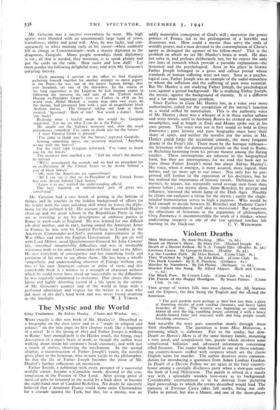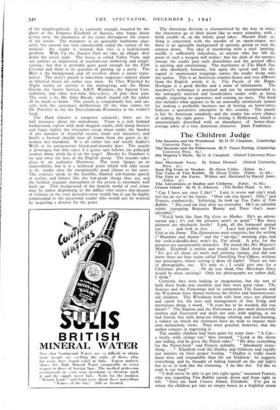Violent Deaths
Miss Mitverton. By Anne Hocking. (131es. 7s. 6d.)
7s. 6d.) The Black Paw. By Conyth Little. (Crime Club. 7s. 6d.) The Puzzle of the Happy Hooligan. By Stuart Palmer. (Crime Club. 75. 6d.)
THIS group of stories falls into two classes, the All Stations and the Express, the first being the English and the second the American.
"The park gardens were perhaps at theii best just then, a glory of flowering shrubs, of pink candled chestnuts, and heavy laden branches of lilac. The wisteria was beginning to come into bloom all over the big, rambling house covering it with a heavy double-bowed front and stuccoed walls and long purple tassels breathing sweetness."
And naturally the story goes somewhat slowly through these thick shrubberies. The quotation is from Miss Milverton, a poisoning which is elaborate. Fair to the reader, but slow. Death on Heron's Mere is of the same literary family, mounting- a very good, and scrupulously fair, puzzle which involves some complicated ballistics and advanced information concerning rifled firearms. The reader finds himself in one of those enchant- ing country-houses stuffed with suspects which are the classic English scene for murder. The author deserves every commen- dation for introducing a quotation from Adam Lindsay Gordon. In Death of a Decent Fellow we are again in the fatal country- house among a carefully ill-chosen party when a shot-gun settles the hash of Lord Milverston. The puzzle is solved in a stately way with a splendidly wooden love-story as its background. Considerable entertainment is to be derived from picturing legal proceedings to which the events described would lead. The mansion of Envious Casca takes full marks, being not only Tudor in period, but also a Manor, and one of the show-places
of the neighbourhood. It is, curiously enough, haunted by the ghost of the Empress Elizabeth of Austria, who hangs about giving away the mechanics of the crime throughout the course of the action. The murderer is an agreeably loathsome char- acter, but custom has very considerably staled the variety of his method : the reader is warned that this is a locked-room problem. With Up the Garden Path we take an abrupt dive down the social scale. The house is called Valley View, and one gathers an impression of machine-cut timbering and rough- casting; but that is probably quite good enough for the Fifth Column and there is no question of putting up a party. The Blitz is the background, and all revolves about a secret trans- mitter. The story's puzzle is somewhat exiguous—sinister aliens in wheelal chairs are rather easy meat. In They Watched by Night enemy air activity is the mainspring, and the Home Guard, the Secret Service, A.R.P. Wardens, the Special Con- stabulary, and other war-time bric-a-brac, all play their part. The story is by Mr. John Rhode, which should tell the addict all he needs to know. The puzzle is scrupulously fair, and un- rolls with the customary deliberation till the time comes for Dr. Priestley to shy the Encyclopaedia Britannica at the reader's head.
The Dark Garden is twopence coloured ; there are no half measures about the melodrama. There is a rich fenland background, replete with dark sluggish canals, chill damp breezes and foggy nights, the characters creep about under the burden of any number of shameful secrets, feuds and injustices, and finally a bastard cheeild rises all loamy from the grave to de- nounce her murderer. It is all rather fun and recalls Sadler's Wells in its unregenerate blood-and-thunder days. The puzzle is grotesque, but who cares if a green spot follows the principal suspect about while he is on the stage? Murder by Numbers is far and away the best of the English group. The murder takes place in an authentic Dartmoor. The story hinges on an impossibility, but it is a technical point which will only occur to th: reader after the exceptionally good climax to the story. The convicts speak in the horrible, blunted sub-human speech of reality, and behave like the low-grade things they are, and the hushed, stagnant atmosphere of the prison is extremely well built up. This background of the brutish world of real crime may be rather displeasing to the addict who enjoys day-dreams of violence in the cosy detective-story world, but it can be highly commended to the occasional reader who would not be worried by acquiring a distaste for the genre.
The American division is characterised by the way in which the characters go to their doom like so many ninepins, with a brisk crackle of, on the whole, good jokes. Murder Ends the Song is concerned with the murder of an opera-singer, and there is an agreeable background of operatic gossip to ease the corpses down. The idea of murdering with a steel knitting- needle is sufficiently ridiculous, as anyone who has felt the point of such a weapon will realise : but the dash of the narrator sweeps the reader past such absurdities and the general effect is exciting and entertaining. The machinery of The Black Paw is also absolutely fantastic, but again the speed and the dis- regard of unnecessary trappings carries the reader along with the author. This is an American country-house and very different from the English article it is. The Puzzle of the Happy Hooligan is a good thriller and a mine of information. The murderer's technique is practical and can be recommended to the unhappily married and beneficiaries under wills as being simple, requiring no apparatus, and causing. no mess. The book also includes what appears to be an unusually satisfactory system for making a profitable business out of betting on horse-races, hitherto a speculative enterprise in this country. The puzzle is fair by American standards and the reader has every chance of making the right guess. The setting is Hollywood, which is entertainingly described with an abundance of better-than- average jokes of a very American character. jOHN FAIRFIELD.























 Previous page
Previous page